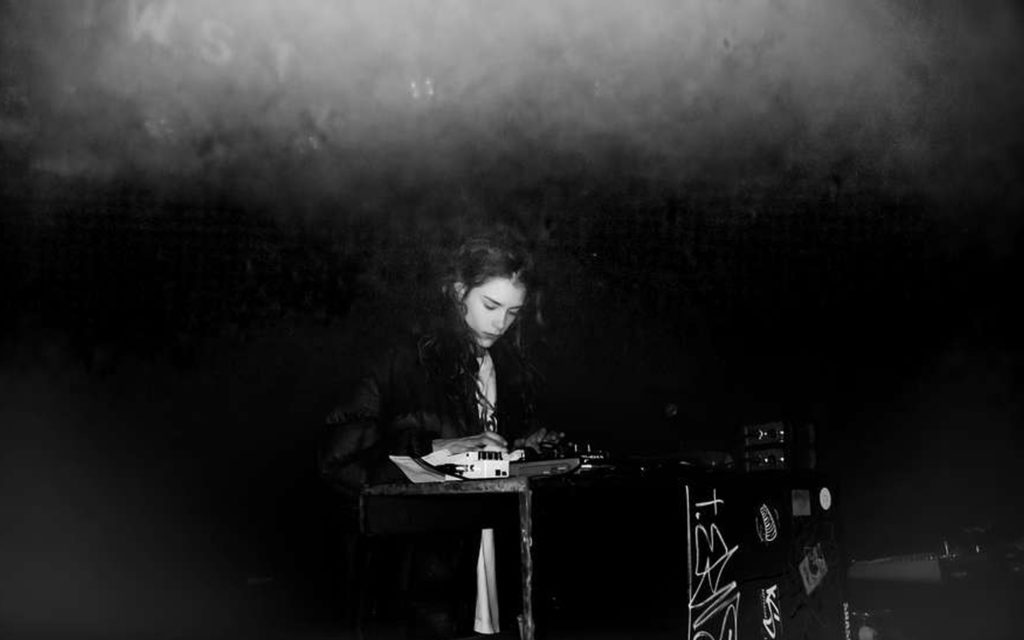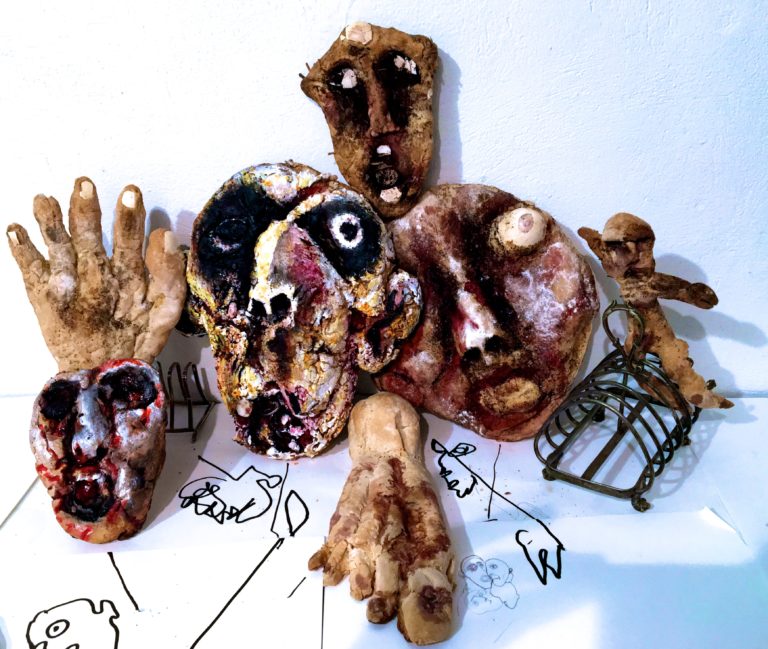
An improvising lyricist, producer and sound artist from Bridgend, Wales, who builds aberrant beats from field recordings, tape, vinyl, instrument and voice. Using sound and voice as an expansive language transgressing intrinsic systemics and inherited syntactical etiquettes, her live shows are unyielding bursts of erupting animation where her caustic stream of consciousness cavorts with restless, glitched-out heaviness.
How has your modus operandi developed in terms of music production over the years – voice, using of field recordings and samples, beats, etc?
I build drum racks in Ableton that contain certain ingredients that shift depending on where I’ve been and who I come into contact with. Khanja screams, Blumbergian brass, Omutaba hits, sea gulls, doors slamming, tapes, metal, tools, jackals, violin, YouTube – the personal associations of all these fragments combined determine the track’s character. The drum rack is like the cast list of a psycho-acoustic drama. Collaborations have been of most importance in my work in the last years. Collaborating is socio-didactic, gives you the chance to step out of your head-dogma and mutate. The collaborations INSIN, Avril Spleen, BAHK, OCDC, Bad@Maths, 0n Est Malade, Gaivln Keiln, Yeah You, and all the ongoing Villa Hybrids are crucial spines, inverted vertebrae.
Yeah You is a project that you started with your dad. It is somehow beautifully pure in its spontaneity – in how you can make music anywhere, on inexpensive gear. Can you talk about this project and its impact on your creative work?
I need the contrast to my work on Ableton, to embody music spontaneously, substituting the capacity to endlessly revise sounds and tweak structure with an experience of direct mediation. This is why we can use whatever, even just voice. Our main technic is psycho-energetic. The idea of a family band transgresses the immunological distinctions between public, private, realist, absurdist, art, and logic, Structure and experiment. Yeah You’s work method and use of space challenges the distinction between practical and experimental, the absurd convenience of making music while driving for example. The idolisation of object and artists put creativity on a pedestal to prevent it from contaminating the orthodox standards of public activity. Yeah You might be what counter-culture looks like when it infects the domestic.
In many of your Yeah You videos, you make music in cars, parking lots, in various environments – whether nondescript non-places or on the road, etc. How important is geography and psychogeography to you?
Intuition is an important part of improvisation, tuning into the other, but the over-tuned mental dynamic of a nuclear-family-duo demands a counter-intuitive lurch. It can come from domestic suffocation rather than fluidity. A situation so familiar with itself, it has to get it out of itself! It has to other itself to see itself. Aiming to jar, we sought places outside our comfort zone, fleeing familiarity, boycotting formulae. Abandoned buildings, motorways, rural, industrial, barren and public spaces, resonated with this self-realising estrangement.
Can you talk about your perhaps less well-known project, Ecce Silicon?
Ecce Silicon, a collective of artists from Bridgend, is my earliest and longest musical project despite it being the least publicly diffused. We perform organic electronic sermons, making use of second-hand electronics and audio archives.
You did a residency at Nyege Nyege Boutiq Studios in Kampala, and the result was released on the Hakuna Kulalal sublabel. How do you look back at the residency and your work with Nyege Nyege?
The Villa, the temple. The variation of what can emerge under one roof is immense. It is always so inspiring to live there and work there. Amazing music coming out of every bedroom door. The studio is a metamorphic sonic laboratory. There is a really unique atmosphere of total commitment without competitiveness, I get critical feedback but never feel judged. Bangers is the common cause. My time there is a huge part of my hope in music infrastructures not becoming crushed by accelerated copy paste hype chuck cultural industry, I keep needing to return, it’s one of my homes.
Perhaps this is an obvious question: how has the pandemic affected your work as an artist. How are you feeling? Are you able to create?
My work always becomes more existentially essential under intense conditions… panic producing! But the pandemic is a constant mental presence. I try to put it into perspective, but it’s hard when you’re limited to your immediate surroundings, and your connective streams bombard you with a range of often contradictory information, perspectives and statistics. Virtual solidarity supplements the intensity of segregation but I’ve never been very good at handling the internet, it’s a polymorphic demagogic abyss! Using it without losing myself takes discipline…
I’m privileged to be in a good working environment, with a huge amount of unfinished material which the sudden break from touring is allowing me to hack into. I also have the time and space for visually assembling, half drawing-half melting, hacking? The way I compose images is kind of how I sample, using whatever is around, inverting use values, the bread heads I make for the Villaelvin artwork are a good example! Yeah You are accidentally on purpose documenting the mental processing of such an abstract disaster; daily vociferating gives me a way to regurgitate obsession, express the excessive information intake.
Do you think it might change the way artists operate – especially in terms of touring, etc?
The complete alienation from routine gives us a chance to critically reflect. This return to basics, and the unprecedented rupture from the adrenaline-paced, jet-set work of constant self- representation in creative industries will open a lot questions. Despite it being an involuntarily unifying experience, it’s hard to account for others… everything depends on where you were and who you were with when the world froze. People are mortified, relived, invariably confronted. But people are breathing and thinking, which maybe those of us on tour, even if we experienced a rich collage of collision and insight, didn’t have room for. In the reassembling of momentum, artists might be more aware of how the pace of their movement affects their work.
I think we will appreciate the ability to travel and connect through music even more after this globally enforced stillness…Europeans are experiencing a fragment of what it is like to be on the other side of mobility privilege. It’s important to know where and why you move, and national hospitality reciprocation should be essential. I’d like to make tours more durational so individual events and contexts can really be absorbed, but maybe that’s because I’m a nomad.
Interview by Lucia Udvardyova
